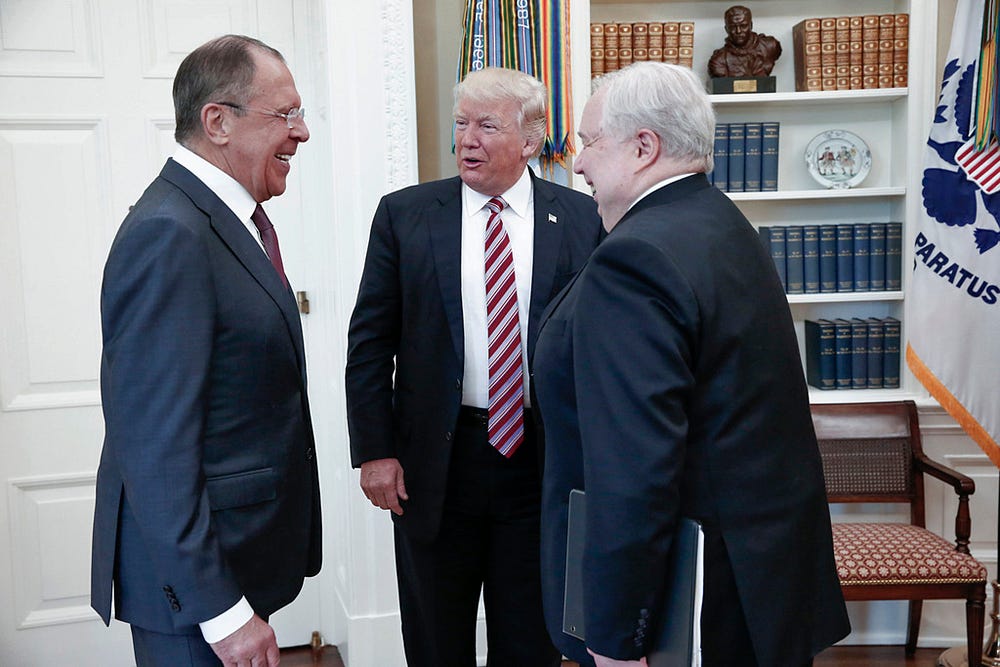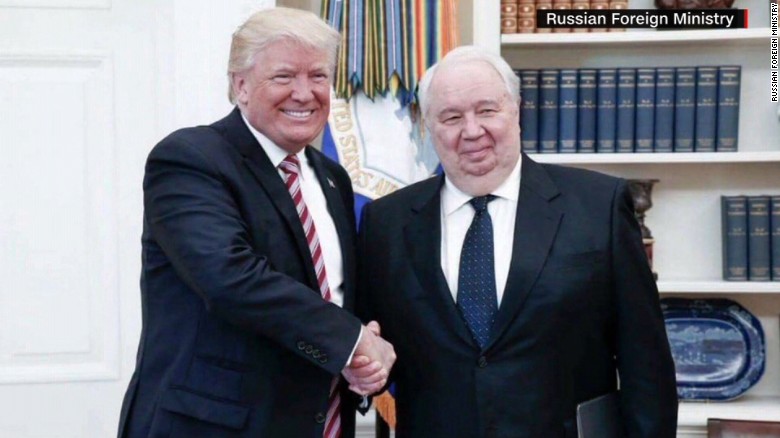
The photo of Sergey Lavrov, Donald Trump, and Sergey Kislyak you weren’t supposed to see. CREDIT: Russian Foreign Ministry Photo via AP
Former Dep. CIA Director: It was not a good idea for Trump to let Russians bring cameras into Oval Office
Noor Al-Sibai
10 MAY 2017 AT 19:52 ET
 |
| Former CIA Deputy Director David Cohen (via Wikimedia Commons). |
The first tweet was written by former national security advisor Colin Kahl, which begged the “deadly serious” question of whether it was “a good idea to let a Russian gov photographer & all their equipment into the Oval Office?”
Former Dep. Director Cohen responded, on Twitter: “no, it was not.”
In subsequent tweets, Kahl went on to say that when he worked for Barack Obama’s administration, he “couldn’t let foreign delegations bring phones/cameras” into his own office in the Eisenhower Executive Office Building, and that he had to leave his own phone and camera outside the Oval Office when he worked there.
“Apparently,” Kahl wrote, “that doesn’t apply to Russ Gov in this WH”.

On Wednesday, President Trump met with Russian Foreign Minister Sergey Lavrov and Russian Ambassador Sergey Kislyak at the White House. Now the administration is “furious” that TASS, the Russian state-owned news agency, has published photos of the meeting.
There’s no shortage of theatrics leading up to the White House’s reactions.
First, the meeting was only supposed to be with Lavrov. Only Lavrov was scheduled to be in attendance, and only Lavrov was mentioned in the official White House readout of the meeting. Thus, it’s only because of the Russian agency’s photos that the public knows Kislyak was also present.
The White House shrugged off Kislyak’s presence, noting there’s nothing suspicious about meeting with an ambassador in the Oval Office.
But this ignores a significant amount of context. The meeting took place the morning after Trump fired FBI Director James Comey, who was investigating alleged ties between the Trump campaign and Russia. That firing came at the recommendation of Attorney General Jeff Sessions, who had supposedly recused himself from the investigation because he didn’t disclose meetings he had with Kislyak while he was serving as a Trump campaign surrogate.
With little believable explanation available for why Trump fired Comey except for his role the Russian investigation, it’s particularly conspicuous that Kislyak would then be in the Oval the very next day. Moreover, an ambassador meeting with the President is far more suspicious when the White House seems to intentionally try to hide it. And now the administration is “furious” that TASS published photos that are the only way anyone even knows Kislyak was present for the meeting.
A second aspect of the theatrics is the fact that when journalists were eventually invited into the Oval, neither Lavrov nor Kislyak were present. Instead, Trump was unexpectedly meeting with former Secretary of State Henry Kissinger.
The optics of this are rather incredible. Many lawmakers and pundits had spent much of the previous 24 hours comparing Trump’s firing of Comey to President Richard Nixon’s “Saturday Night Massacre,” when he fired an attorney general and a deputy attorney general because they wouldn’t remove the special prosecutor investigating the Watergate scandal. Kissinger was not implicated in Watergate, but it was still rather surprising Trump would have a surprise meeting with the man who served as Nixon’s Secretary of State and National Security Adviser. They discussed “Russia and various other matters,” according to the pool report.
The reason American journalists never saw Lavrov and Kislyak leave — or even knew Kislyak was there — was because the meeting was closed to them. When the TASS photos were first published, it obviously raised questions as to why Russian media was allowed in but not American media.
You can read Kahl and Cohen’s tweets below.
Deadly serious Q: Was it a good idea to let a Russian gov photographer & all their equipment into the Oval Office? twitter.com/paleofuture/st…
@ColinKahl No, it was not.


No comments:
Post a Comment